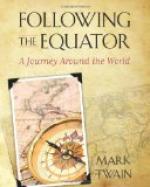Australia has a slang of its own. This is a matter of course. The vast cattle and sheep industries, the strange aspects of the country, and the strange native animals, brute and human, are matters which would naturally breed a local slang. I have notes of this slang somewhere, but at the moment I can call to mind only a few of the words and phrases. They are expressive ones. The wide, sterile, unpeopled deserts have created eloquent phrases like “No Man’s Land” and the “Never-never Country.” Also this felicitous form: “She lives in the Never-never Country”—that is, she is an old maid. And this one is not without merit: “heifer-paddock”—young ladies’ seminary. “Bail up” and “stick up” equivalent of our highwayman-term to “hold up” a stage-coach or a train. “New-chum” is the equivalent of our “tenderfoot”—new arrival.
And then there is the immortal “My word!” “We must import it.” “M-y word!”
“In cold print it is the equivalent of our “Ger-rreat Caesar!” but spoken with the proper Australian unction and fervency, it is worth six of it for grace and charm and expressiveness. Our form is rude and explosive; it is not suited to the drawing-room or the heifer-paddock; but “M-y word!” is, and is music to the ear, too, when the utterer knows how to say it. I saw it in print several times on the Pacific Ocean, but it struck me coldly, it aroused no sympathy. That was because it was the dead corpse of the thing, the ’soul was not there—the tones were lacking—the informing spirit—the deep feeling—the eloquence. But the first time I heard an Australian say it, it was positively thrilling.
CHAPTER XXIII.
Be careless in your dress if you must, but keep a
tidy soul.
—Pudd’nhead
Wilson’s New Calendar.
We left Adelaide in due course, and went to Horsham, in the colony of Victoria; a good deal of a journey, if I remember rightly, but pleasant. Horsham sits in a plain which is as level as a floor—one of those famous dead levels which Australian books describe so often; gray, bare, sombre, melancholy, baked, cracked, in the tedious long drouths, but a horizonless ocean of vivid green grass the day after a rain. A country town, peaceful, reposeful, inviting, full of snug homes, with garden plots, and plenty of shrubbery and flowers.
“Horsham, October 17. At the hotel. The weather divine. Across the way, in front of the London Bank of Australia, is a very handsome cottonwood. It is in opulent leaf, and every leaf perfect. The full power of the on-rushing spring is upon it, and I imagine I can see it grow. Alongside the bank and a little way back in the garden there is a row of soaring fountain-sprays of delicate feathery foliage quivering in the breeze, and mottled with flashes of light that shift and play through the mass like flash-lights through an opal—a most beautiful tree, and a striking contrast to the cottonwood. Every leaf of the cottonwood is distinctly defined—it is a kodak for faithful, hard, unsentimental detail; the other an impressionist picture, delicious to look upon, full of a subtle and exquisite charm, but all details fused in a swoon of vague and soft loveliness.”




